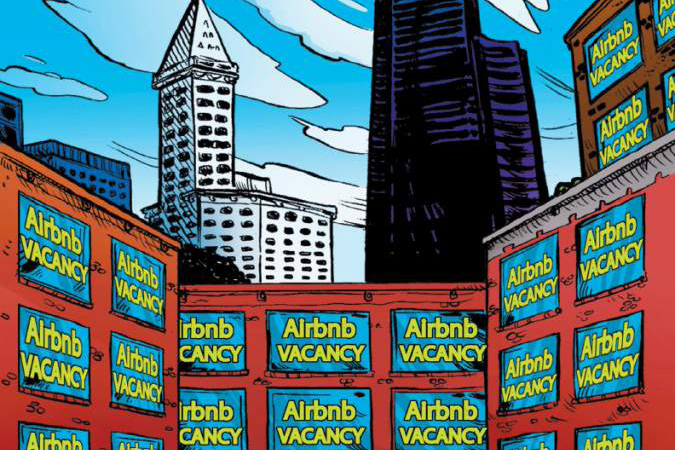It took nearly two years, but the City Council’s Affordable Housing, Neighborhoods, and Finance Committee has officially released its proposed regulations for short-term rental units in Seattle.
The original impetus for developing said regulations stemmed from fears that the lucrative industry—facilitated primarily through platforms like Airbnb and VRBO—could shrink Seattle’s affordable housing stock by turning otherwise available long-term rental units into moneymakers for homeowners. “Left unchecked, there is concern that online rental platforms, like Airbnb and VRBO, just might provide enough financial incentives to cause homeowners to switch long-term rentals to short-term vacation rentals,” Councilmember Tim Burgess wrote in January 2016. “At a time when we face a shortage of affordable rental housing, this issue deserves a closer look.” Some local residents voiced similar concerns, and some still do—pointing, for example, to Vancouver, B.C., where at least one study suggests Airbnb is causing a serious drain on the long-term rental housing supply.
But Airbnb came back hard, denying the biggest fears the city and its residents might have had (“the listings on our platform take up less than one percent of the housing stock in the city of Seattle,” said David Owen, Regional Head of Policy for Airbnb, at the time); and local operators formed the Seattle Short Term Rental Alliance (SSTRA) to advocate for a voice in the process. At least since last June, when Burgess and then-mayor Ed Murray first released a pass at regulations, Councilmembers have been fielding ongoing conversations with a number of stakeholders and residents, including the SSTRA and Airbnb.
This week, the Council released close-to-final rules that—according to most of the public commenters on Friday morning in Council chambers—strike a balance between limiting and taxing the rentals while still allowing these small businesses to thrive. Airbnb rentals often help people pay their mortgages or afford Seattle post-retirement, supporters argue, and having more tourists in residential areas can also create extra foot traffic for small, neighborhood businesses.
“Thank you, thank you so much for all of your extremely hard work,” Airbnb Public Policy director Laura Spanjian told the committee. “It’s been a long road, and we appreciate the hours you put in to really create a regulatory structure that works. It’s a compromise, it’s fair … [and] it addresses issues that are specific to Seattle.”
Michelle Acquavella, chair of the SSTRA and owner of Sea to Sky rentals, agreed. “This reasonable regulation achieves what we, the short-term rental community, asked of our City Council,” she said. “It’s balanced, fair, and thoughtful. This is what democracy looks like.”
The new regulations, if enacted as outlined, would do a number of key things. They would limit the number of short-term rental properties to two per owner; require that these owners obtain a new kind of license to operate, in addition to their business license, at a cost of $75 per year; and add a $10 per night fee on each short-term rental, money which would be used to bolster the city’s affordable housing programs. There are a handful of exceptions to the two-property limit, however. Existing short-term rental operators in Downtown, South Lake Union, and Uptown urban centers and certain buildings in Capitol Hill and First Hill would be allowed to keep operating the units they have, and to add two more to their listings, if desired. City staffers estimate, with the caveat that their data is very limited, the number of short-term rentals the new rules could potentially take off the market is between 400 and 700.
Some people see all of this as quite reasonable; others feel the regulations don’t go far enough. “My concern with this legislation is it doesn’t appear to really control the proliferation of short-term rentals in residential areas,” said one commenter, adding that he believed too many rentals like these could supplant thriving communities with hollowed-out neighborhoods run by absentee landlords.
And since the new rules would give downtown neighborhoods much looser restrictions, there wouldn’t be much change for the long-term residents of Belltown, say. Several commenters live in downtown condominiums where an increasing number of units are being converted to short-term rentals, which has an impact on building-wide maintenance, water use, and security issues—costs that single-unit condo owners often have to help pay. “I’m all for the shared economy, but this is anything but shared,” said one Belltown resident. “Resident owners are instead subsidizing multiple businesses.” Said another: “Our neighbors are being displaced by tourists. Are we next?”
In any case, Councilmembers said Friday, there are some details that still need to be worked out. Among them is the $10 per-night fee. The fee, according to Councilmember Rob Johnson, was developed with the goal of making nightly taxes for Airbnb and VRBO rentals on par with the taxes that hotels and motels pay, but that kind of calculation is necessarily complex and involves some “interesting math,” he said. “I think 10 dollars is the starting place for our discussions.”
The proposed regulations, likely following some more conversations and slight amendments, will go before the full Council in October.
sbernard@seattleweekly.com








